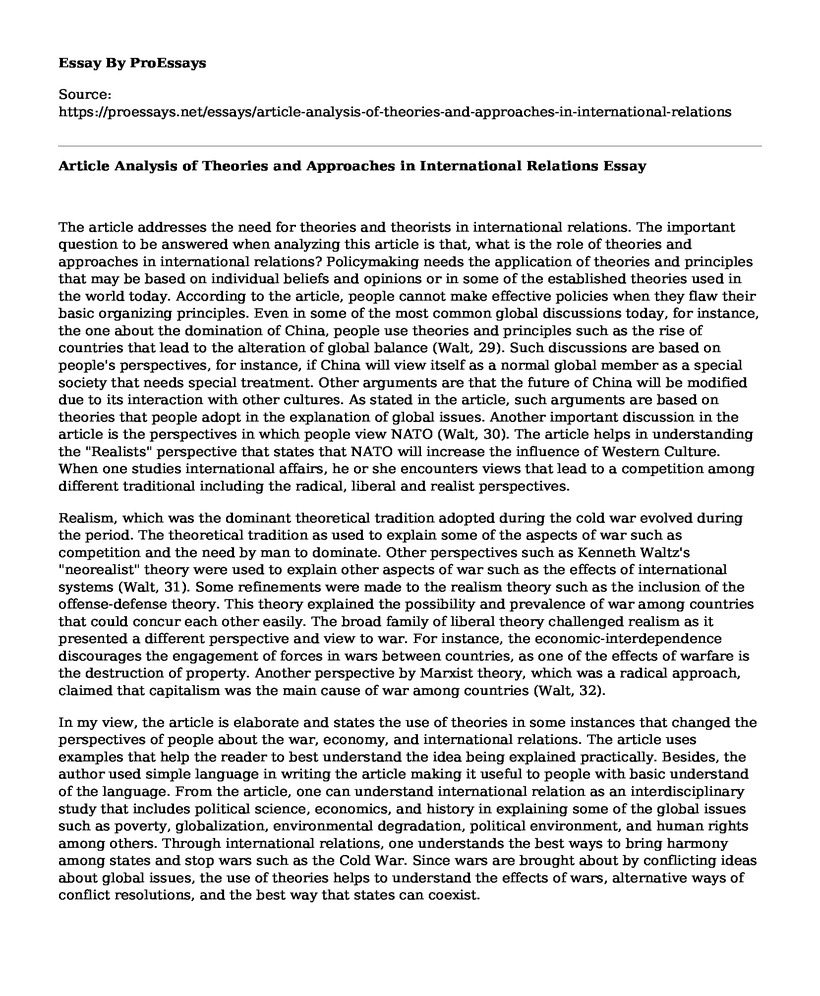The article addresses the need for theories and theorists in international relations. The important question to be answered when analyzing this article is that, what is the role of theories and approaches in international relations? Policymaking needs the application of theories and principles that may be based on individual beliefs and opinions or in some of the established theories used in the world today. According to the article, people cannot make effective policies when they flaw their basic organizing principles. Even in some of the most common global discussions today, for instance, the one about the domination of China, people use theories and principles such as the rise of countries that lead to the alteration of global balance (Walt, 29). Such discussions are based on people's perspectives, for instance, if China will view itself as a normal global member as a special society that needs special treatment. Other arguments are that the future of China will be modified due to its interaction with other cultures. As stated in the article, such arguments are based on theories that people adopt in the explanation of global issues. Another important discussion in the article is the perspectives in which people view NATO (Walt, 30). The article helps in understanding the "Realists" perspective that states that NATO will increase the influence of Western Culture. When one studies international affairs, he or she encounters views that lead to a competition among different traditional including the radical, liberal and realist perspectives.
Realism, which was the dominant theoretical tradition adopted during the cold war evolved during the period. The theoretical tradition as used to explain some of the aspects of war such as competition and the need by man to dominate. Other perspectives such as Kenneth Waltz's "neorealist" theory were used to explain other aspects of war such as the effects of international systems (Walt, 31). Some refinements were made to the realism theory such as the inclusion of the offense-defense theory. This theory explained the possibility and prevalence of war among countries that could concur each other easily. The broad family of liberal theory challenged realism as it presented a different perspective and view to war. For instance, the economic-interdependence discourages the engagement of forces in wars between countries, as one of the effects of warfare is the destruction of property. Another perspective by Marxist theory, which was a radical approach, claimed that capitalism was the main cause of war among countries (Walt, 32).
In my view, the article is elaborate and states the use of theories in some instances that changed the perspectives of people about the war, economy, and international relations. The article uses examples that help the reader to best understand the idea being explained practically. Besides, the author used simple language in writing the article making it useful to people with basic understand of the language. From the article, one can understand international relation as an interdisciplinary study that includes political science, economics, and history in explaining some of the global issues such as poverty, globalization, environmental degradation, political environment, and human rights among others. Through international relations, one understands the best ways to bring harmony among states and stop wars such as the Cold War. Since wars are brought about by conflicting ideas about global issues, the use of theories helps to understand the effects of wars, alternative ways of conflict resolutions, and the best way that states can coexist.
Conclusion
In summary, some of the important points in the article include the elaboration of various theories and their role in international relations. The refinements of theories such as the realism set of theories are important in understanding their role in the understanding cause of wars and various reasons why wars are not the solution to the issues that required better understanding during the Cold War.
Work Cited
Walt, Stephen M. "International Relations: One World, Many Theories." Foreign Policy, no. 110, 1998, p. 29. JSTOR, doi:10.2307/1149275.
Cite this page
Article Analysis of Theories and Approaches in International Relations. (2022, Nov 20). Retrieved from https://proessays.net/essays/article-analysis-of-theories-and-approaches-in-international-relations
If you are the original author of this essay and no longer wish to have it published on the ProEssays website, please click below to request its removal:
- Rhetorical Essay on Student Truancy
- Contraband Law Essay Example
- Save the Government: Take Back the Media Essay Example
- Essay Sample on Problems of the Present Day Democratic Nation State
- Policy Research: Applying Social Science to Solve Problems - Research Paper
- Research Paper on Inclusive Development: Key Indicators & Reasons for Promotion
- Free Essay Sample: Risks Faced Australian Government







